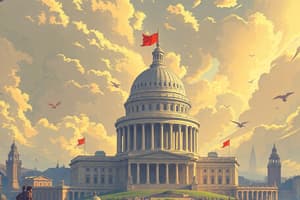Podcast
Questions and Answers
ନୀତିଶାସ୍ତ୍ର କ'ଣ ବିଷୟରେ ଅଧିକ ଚିନ୍ତା-ବିଚାର କରେ?
ନୀତିଶାସ୍ତ୍ର କ'ଣ ବିଷୟରେ ଅଧିକ ଚିନ୍ତା-ବିଚାର କରେ?
- ଜନସାଧାରଣ ମତ (correct)
- ସରକାରୀ ରଣନୀତି (correct)
- ଚିତ୍ରକଳା
- ଆନ୍ତାର୍ଜାତୀୟ ଯୋଗାଯୋଗ (correct)
କାହାକୁ 'ରାଷ୍ଟ୍ର' କୁହାଯାଇଥାଏ?
କାହାକୁ 'ରାଷ୍ଟ୍ର' କୁହାଯାଇଥାଏ?
- ବିଶିଷ୍ଟ ଅঞ্চଳରେ ଏକ ସରକାର (correct)
- ଜୀବଣକାଳୀନ ଗୋଷ୍ଠୀ
- ଜନସଂଖ୍ୟାର ଅଳ୍ପତା
- ଆପଣଙ୍କର ସ୍ୱାସ୍ଥ୍ୟ
ଶକ୍ତିଙ୍କ ଅର୍ଥ କ'ଣ?
ଶକ୍ତିଙ୍କ ଅର୍ଥ କ'ଣ?
- ନିଲମ୍ବନ କାର୍ଯ୍ୟ
- କିଛି ନ କରିବାକୁ ସମର୍ଥ (correct)
- ଅବଲମ୍ବନ ସମ୍ପର୍କ
- ନୟା ବିଚାରଧାରା
ହୃଦୟର ନିତି କ'ଣ?
ହୃଦୟର ନିତି କ'ଣ?
ପ୍ରାତିକାର ପରିବେଶ କ'ଣ?
ପ୍ରାତିକାର ପରିବେଶ କ'ଣ?
ଲୋକତନ୍ତ୍ର ସମ୍ପର୍କିତ କ'ଣ?
ଲୋକତନ୍ତ୍ର ସମ୍ପର୍କିତ କ'ଣ?
ସରକାରୀ ନୀତିର ଅନ୍ତର୍ଗତ କ'ଣ ତଥ୍ୟବାସ ସମ୍ପର୍କିତ?
ସରକାରୀ ନୀତିର ଅନ୍ତର୍ଗତ କ'ଣ ତଥ୍ୟବାସ ସମ୍ପର୍କିତ?
ନିଷ୍ପତ୍ତି ସଂସ୍କୃତି ସମ୍ପର୍କରେ କ'ଣ?
ନିଷ୍ପତ୍ତି ସଂସ୍କୃତି ସମ୍ପର୍କରେ କ'ଣ?
Flashcards are hidden until you start studying
Study Notes
Overview of Political Science
- Definition: The study of politics, government systems, and political behavior.
- Branches:
- Comparative Politics: Examines different political systems and their functions.
- International Relations: Focuses on interactions between countries, including diplomacy and conflict.
- Political Theory: Investigates ideas and philosophies underpinning political systems.
- Public Administration: Studies the implementation of government policy and public sector management.
- Public Policy: Analyzes the creation, implementation, and effects of policies.
Key Concepts
- Political Systems: Structures through which political power is organized (e.g., democracies, authoritarian regimes).
- Political Ideologies: Sets of beliefs about politics (e.g., liberalism, conservatism, socialism).
- State and Nation:
- State: Political entity with a defined territory and government.
- Nation: Group of people with shared identity, culture, and history.
- Sovereignty: The authority of a state to govern itself without external interference.
- Power and Authority:
- Power: The ability to influence or control others.
- Authority: Recognized right to exercise power.
Political Institutions
- Legislatures: Bodies responsible for making laws (e.g., Congress, Parliament).
- Executives: Leaders responsible for enforcing laws (e.g., Presidents, Prime Ministers).
- Judiciaries: Courts that interpret laws and administer justice.
- Political Parties: Organizations that represent specific ideologies and seek to gain political power.
Political Behavior
- Voting: Process through which citizens express preferences in elections.
- Political Participation: Engagement of individuals in political processes (e.g., protests, advocacy).
- Public Opinion: Collective attitudes and beliefs about political issues and leaders.
International Relations Theories
- Realism: Focuses on power and national interest.
- Liberalism: Emphasizes cooperation, international institutions, and the role of democracy.
- Constructivism: Examines how ideas, identities, and norms shape international relations.
Current Trends
- Globalization: Increasing interconnectedness of countries economically, socially, and politically.
- Populism: Political approach that seeks to represent the interests of ordinary people and often opposes elites.
- Authoritarianism: Rise in non-democratic governance methods and systems in various regions.
Research Methods in Political Science
- Qualitative Methods: Case studies, interviews, and ethnography to understand complex political phenomena.
- Quantitative Methods: Statistical analysis and surveys to identify patterns and test hypotheses.
Important Figures
- Machiavelli: Known for his work on political power and ethics.
- John Locke: Influential in social contract theory and liberal democracy.
- Karl Marx: Critiqued capitalism and analyzed class struggle.
These notes provide a foundational understanding of political science as a discipline, covering its scope, key concepts, institutions, and current trends.
ରାଜନୈତିକ ଶాస్త୍ରର ଅବଲୋକନ
- ପରିଭାଷା: ରାଜନୀତି, ସରକାରି ପ୍ରଣାଳୀ, ଏବଂ ରାଜନୈତିକ ବ୍ୟବହାରର ଅଧ୍ୟୟନ।
- ଶାଖାଗୁଡ଼ିକ:
- ସମ୍ପର୍କୀୟ ରାଜନୀତି: ବିଭିନ୍ନ ରାଜନୈତିକ ପ୍ରଣାଳୀଗୁଡ଼ିକୁ ଓ ତାହାଙ୍କର କାର୍ଯ୍ୟପଦ୍ଧତିକୁ ଅନ୍ବେଷଣ କରେ।
- ଆନ୍ତର୍ଜାତୀୟ ସମ୍ପର୍କ: ଦେଶଗୁଡ଼ିକର ଆପସରେ ସମ୍ପର୍କ, ଚଳାଚଳ, ଏବଂ ସଂଘାତ ଉପରେ କେନ୍ଦ୍ରିତ।
- ରାଜନୀତିକ ସୂତ୍ର: ରାଜନୈତିକ ପ୍ରଣାଳୀର ଆଧାରରେ ଚିନ୍ତାଧାରା ଓ ଦାର୍ଶନିକତାଙ୍କୁ ଅନ୍ବେଷଣ କରେ।
- ସାଧାରଣ ପ୍ରଶାସନ: ସରକାରୀ ପ୍ରବନ୍ଧ ଓ ଜନସେବା ପ୍ରଶାସନର ଅଧ୍ୟୟନ।
- ସାଧାରଣ ନୀତି: ନୀତିଗତ ଉତ୍ପତ୍ତି, କାର୍ଯ୍ୟନ୍ବୟନ ଓ ପ୍ରଭାବ ସମ୍ପର୍କରେ ତଥ୍ୟାନ୍ବେଷଣ କରେ।
କୀ ସଂକଳ୍ପଗୁଡ଼ିକ
- ରାଜନୈତିକ ପ୍ରଣାଳୀ: ଯେଉଁଥିରେ ରାଜନୈତିକ ଶକ୍ତିର ସଂଗଠନଗୁଡ଼ିକୁ ଦର୍ଶାଯିବା (ଗଣତନ୍ତ୍ର, ଅଧିକାରୀ ପ୍ରଜନ୍ତା)।
- ରାଜନୈତିକ ଧାରଣା: ରାଜନୀତି ସମ୍ପର୍କରେ ବିଶ୍ୱାସଗତ ସେଟ୍ (ଲିବରାଲିଜ୍ମ, କଂସର୍ଭେଟିବିଜ୍ମ, ସୋସିଆଲିଜ୍ମ)।
- ରାଜ୍ୟ ଓ ଜାତି:
- ରାଜ୍ୟ: ନିର୍ଦ୍ଦିଷ୍ଟ ଭූମି ଓ ସରକାର ସହିତ ରାଜନୈତିକ ପରିଚୟ।
- ଜାତି: ସାମାଜିକ ଚିହ୍ନ, ସଂସ୍କୃତି, ଓ ଇତିହାସ ସହିତ ଆକୃତିଥାକୁ ରଖୁଥିବା ସମୂହ।
- ସ୍ଵାଧୀନତା: ବାହ୍ୟ ଅସୋଟାକର ଗଭୀର ଓ ସ୍ବାଧୀନ ଶୋଧଣା କରିବାର ଅଧିକାର।
- ଶକ୍ତି ଓ କ୍ଷମତା:
- ଶକ୍ତି: ଅନ୍ୟମାନେ ଉପରେ ପ୍ରଭାବ ଓ କଣ୍ଟ୍ରୋଲ କରିବାର ଶକ୍ତି।
- କ୍ଷମତା: ଶକ୍ତି ଭ୍ରାମ କରିବାର ସ୍ୱୀକୃତିତଚନ୍ତା।
ରାଜନୈତିକ ସଂସ୍ଥା
- ବିଧାନସଭା: ନିୟମ କରାଇବାର ଦାୟିତ୍ୱରେ ଥିବା ସଂସ୍ଥା (କଙ୍ଗ୍ରେସ୍, ପାର୍ଲିମେଣ୍ଟ)।
- ଏକ୍ଜିକୁଟିଭ୍: ନିୟମ ନିଷ୍ପାଦନ କରିବାର ଦାୟିତ୍ୱରେ ଥିବା ନେତା (ପ୍ରେସିଡେଣ୍ଟ, ପ୍ରାମ୍ମିନିଷ୍ଟର)।
- ନ୍ୟାୟାଳୟ: ନିୟମ ଅର୍ଥ ବ୍ୟାଖ୍ୟା କରିବା ଓ ନ୍ୟାୟବିବାରଣ କରିବାର ଦାୟିତ୍ୱ କ୍ଷେତ୍ର।
- ରାଜନୈତିକ ପାର୍ଟୀ: ଏକ ନିର୍ଦ୍ଦିଷ୍ଟ ଧାରଣାକୁ ପ୍ରତିନିଧିତା କରି ରାଜନୈତିକ ଶକ୍ତି ଲାଗି ଚେଷ୍ଟା କରୁଥିବା ଏକ ସଂସ୍ଥା।
ରାଜନୈତିକ ବ୍ୟବହାର
- ଭୋଟି ଦିଅଣୀ: ନାଗରିକଙ୍କ ସେଲେକ୍ସନ ପ୍ରକ୍ରିୟା ଯାହା ଚୁନାବରେ ପ୍ରଧାନ ସ୍ଥାନ ଦେଇଥାଏ।
- ରାଜନୈତିକ ସାମିଳିକରଣ: ପ୍ରକ୍ରିୟାରେ ବ୍ୟକ୍ତିଗତ ଜନପ୍ରତିନିଧିତାରେ ଭାଗ ନେବା (ବିପ୍ଲବ, ସମର୍ଥନ)।
- ସାଧାରଣ ମତାମତ: ରାଜନୈତିକ ବିଷୟସମୂହ ଓ ନେତାମାନେ ସମ୍ପର୍କରେ ସାଧାରଣ ଭାବନା।
ଆନ୍ତର୍ଜାତୀୟ ସମ୍ପର୍କ ଧାରଣା
- ରିଆଲିଜମ: ସ୍କୋଟ୍ ପ୍ରଥମ କ୍ଷେତ୍ରସ୍ଥିତିରେ ଶକ୍ତି ଓ ଜାତୀୟ ଇସ୍ତାକରେ କେନ୍ଦ୍ରାୟିତ।
- ଲିବରାଲିଜ୍ମ: ସମ୍ପର୍କ, ଆନ୍ତର୍ଜାତୀୟ ପ୍ରତିଷ୍ଠାନ, ଓ ଗଣତନ୍ତ୍ରର ଭୂମିକାରେ ସହଯୋଗକୁ ଗୁରୁତ୍ୱ ଦେୟ।
- କନସ୍ଟ୍ରକ୍ଟିଭିଜ୍ମ: ଭାବନା, ଇଡେଣ୍ଟିଟି, ଓ ନୀତିଗତ ପରିଚୟର ଆଧାରରେ ଆନ୍ତର୍ଜାତୀୟ ସମ୍ପର୍କ ସଂସ୍କୃତିକୁ ଅନ୍ବେଷଣ କରେ।
ବର୍ତ୍ତମାନ ସ୍ର୍ଣ୍ଣଧାରା
- ଗ୍ଲୋବାଲିଜେସନ: ରାଜନୈତିକ, ସାମାଜିକ, ଓ ଆର୍ଥିକ ଦୃଷ୍ଟିକୋଣରୁ ଦେଶ
Studying That Suits You
Use AI to generate personalized quizzes and flashcards to suit your learning preferences.




